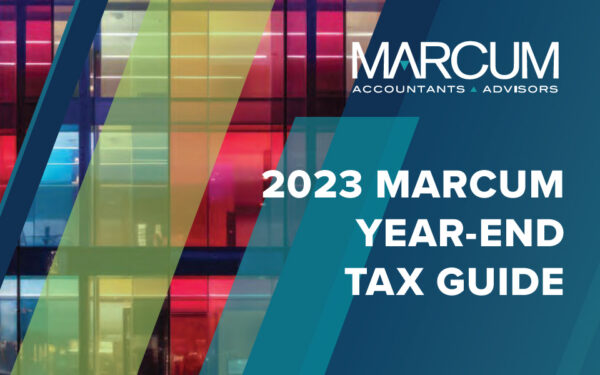Key Considerations for 2024 Corporate Tax Planning, Including Capitalizing Technology Expenditures, and the IRS’ Use of Artificial Intelligence
By Pam Kahlon, Director, Tax & Business Services
Whether taxpayers are having a good year, rebounding from recent losses, or still struggling to get off the ground, tax planning is an integral part of any corporation’s overall business planning.
Capitalization of Specified Research or Experimentation (SRE) Costs
With the amendment of IRC Section 174 as part of the Tax Cuts and Jobs Act (TCJA) of 2017, calendar year 2022 was the first year many taxpayers found themselves capitalizing significant amounts of specified research and experimental expenditures with little guidance from the IRS.
Finally, on Sept. 8 of this year, the IRS published Notice 2023-63, providing interim guidance on the capitalization and amortization of SRE expenditures incurred in taxable years beginning after Dec. 31, 2021. The interim guidance addresses many questions while leaving other anticipated questions unaddressed.
- Identification and allocation of costs: Examples of costs that are SRE expenditures are provided, including expenses considered incident to research and experimental activities, as well as a non-exhaustive list of costs not treated as SRE expenditures.
- Midpoint amortization: The notice clarifies the definition of midpoint to provide that for full, 12-month taxable years, amortization begins on the first day of the seventh month of the taxable year, and for short taxable years, amortization starts on the first day of the midpoint month. If a short taxable year encompasses a fraction of a month, the entire month counts in the calculation, avoiding double counting the same month.
- Software development: Software development is broadly defined in the notice and includes upgrades and enhancements (such as modifications to existing software that add functionality or improve its speed and efficiency). Activities considered as software development for Section 174 purposes include planning, designing, modeling, coding, and testing.
- Research performed under contract: The notice provides that the existing rules for treating costs paid or incurred for research conducted under contract are unchanged. However, the IRS clarifies that costs incurred by the research provider (the party contracting to perform research services or develop an SRE product) are SRE expenditures if the provider assumes financial risk within the contract or possesses the right to use or exploit the resulting SRE product within its trade or business, including through methods such as sale, lease, or licensing.
- Disposition, retirement, or abandonment of property: Section 174(d) prohibits a deduction of SRE expenditures due to disposition, retirement, or abandonment; however, the notice provides relief to corporations by stating if a corporation ceases to exist in a transaction or series of transactions not covered by Section 381(a), the corporation is allowed a deduction equal to the unamortized SRE expenditures in its final taxable year. This provision does not apply if the principal purpose of the transaction is to claim a deduction for the unamortized SRE expenditures or if the SRE expenditures are paid or incurred for property that is contributed to, distributed from, or transferred from a partnership.
Bonus Depreciation
The Tax Cuts and Jobs Act (TCJA) of 2017 initially allowed taxpayers to claim a depreciation deduction of 100% of the purchase price on qualifying property instead of deducting smaller amounts each year over the useful life of the property. Qualified property includes assets with a recovery period of 20 years or less, depreciable computer software, and eligible improvement property. This applies to both new and used assets as long as the taxpayer has not previously used the acquired property or received it from a related party. Beginning on January 1, 2023, bonus depreciation started to phase out and will continue for the next four years, as follows:
- 2023 (1/1/23 – 12/31/23) – 80% bonus depreciation allowed
- 2024 (1/1/24 – 12/31/24) – 60% bonus depreciation allowed
- 2025 (1/1/25 – 12/31/25) – 40% bonus depreciation allowed
- 2026 (1/1/26 – 12/31/26) – 20% bonus depreciation allowed
Without new legislation, bonus depreciation will be completely phased out starting January 1, 2027.
IRS Announces Pause on New ERTC Credits
- IRS issued News Release IR-2023-169, stating it will pause processing new ERTC claims through the end of 2023. This is due to concern that a flood of new claims is, in fact, ineligible and are putting businesses at risk due to being pressured and scammed by aggressive promoters and marketing,
- IRS is developing new initiatives for businesses that were victims of aggressive promoters, including a settlement program for improper ERTC payments received. This is expected to be rolled out in late 2023. The program will allow the business to avoid penalties and future compliance actions.
IRS Using AI and Other Technology to Identify Schemes to Avoid Taxes
The IRS recently announced the start of a sweeping effort to restore fairness in tax compliance by shifting more attention onto high-income earners, partnerships, large corporations, and promoters abusing the nation’s tax laws.
The effort will center on adding a greater focus on high-net-income/worth individuals and partnerships. This group of taxpayers has experienced a decline in audit rates during the past decade. These changes will be driven with the help of improved technology, including Artificial Intelligence that will assist the IRS to better detect tax cheating, identify emerging compliance threats, and improve case selection tools to avoid burdening taxpayers with needless “no-change” audits.
As part of the effort, the IRS will ensure audit rates do not increase for those earning less than $400,000.
Key elements of this new effort include:
Major Expansion in High-Income/High-Wealth and Partnership Compliance Work
- Prioritization of high-income cases. In the High Wealth, High Balance Due Taxpayer Field Initiative, the IRS will focus its audit work on taxpayers with total positive income above $1 million with more than $250,000 in recognized tax debt. The IRS will have dozens of Revenue Officers focusing on high-end collection cases in FY 2024. The IRS is working to expand this effort and plans to contact approximately 1,600 taxpayers in this category who owe hundreds of millions of dollars in taxes.
- Expansion of pilot program focused on largest partnerships leveraging Artificial Intelligence (AI). In 2021, the IRS launched the first stage of its Large Partnership Compliance (LPC) program with examinations of some of the largest and most complex partnership returns in the filing population. The IRS is now expanding the LPC program to include additional large partnerships. With the help of AI, the selection of these returns is the result of collaboration with data science and tax enforcement experts, who have been working to apply cutting-edge machine learning technology to identify potential compliance risks in the areas of partnership tax, general income tax and accounting, and international taxation in a taxpayer segment that historically has been subject to limited examination coverage. The IRS plans to open examinations of 75 of the largest partnerships in the U.S. (partnerships with more than $10 billion in assets) representing a cross-section of industries, including hedge funds, real estate investment partnerships, publicly traded partnerships, and large law firms.
- Greater focus on partnership issues through compliance letters. The IRS has identified ongoing discrepancies on balance sheets involving partnerships with over $10 million in assets, which could be an indicator of potential non-compliance. The number of such discrepancies has been increasing over the years. Many of these taxpayers do not attach required statements explaining the difference. The IRS effort will focus on high-risk large partnerships to quickly address the balance sheet discrepancies. By early October 2023, the IRS will begin contacting approximately 500 partnerships. Depending on the responses to its correspondence, the IRS may add these to the audit stream for additional work.
Priority Areas for Targeted Compliance Work in FY 2024
The IRS has launched numerous compliance efforts to address serious issues like micro-captive insurance arrangements and syndicated conservation easement abuses, which have received extensive public attention. Some of the additional priority areas the IRS will be focused on that will touch the wealthy evaders include:
- Expanded work on digital assets. The IRS Virtual Currency Compliance Campaign will continue in the months ahead after an initial review showed the potential for a 75% non-compliance rate among taxpayers identified through record production from digital currency exchanges. The IRS projects more digital asset cases will be developed for further compliance work early in 2024.
- More scrutiny on FBAR violations. High-income taxpayers continue to utilize foreign bank accounts to avoid disclosure and related taxes. A U.S. person with a financial interest in a foreign financial account is required to file a Report of Foreign Bank and Financial Accounts (FBAR) if the aggregate value of all foreign financial accounts is more than $10,000 at any time. The IRS plans to audit the most egregious potential non-filer FBAR cases in 2024.
- Labor brokers. The IRS is aware of instances where construction contractors are filing Form 1099-MISC/1099-NEC payments to a subcontractor, but the subcontractor is really a “shell” company that has no legitimate business relationship with the contractor. Monies paid to shell companies are exchanged at Money Service Businesses or flowed through accounts in the shell company’s name and returned to the original contractor. The IRS will expand attention in this area with civil audits and criminal investigations.
Improved Compliance Selections; Protecting Taxpayers and Businesses from Aggressive Scams and Schemes
In addition to expanding compliance attention on high-income taxpayers and partnerships, the IRS will focus on ensuring audit fairness and protecting all taxpayers from a variety of scams and schemes. Scammers and fraudsters frequently target average taxpayers with more modest incomes. Protecting these hard-working taxpayers is critical to ensuring the success of the nation’s tax system, and the IRS will be working throughout the fall and into the 2024 filing season to take steps to help people.
- Improved equity in audits. The IRS continues to focus on enhancing audits involving Earned Income Tax Credits and plans to implement changes for the next filing season.
- Emerging scam issues. The IRS will continue aggressively warning consumers about emerging scams and schemes. Building off efforts like its Dirty Dozen list, the IRS plans to warn taxpayers about quickly emerging scams, some of which confuse taxpayers into trying to claim refunds worth thousands of dollars.
- Protection against identity theft. The IRS will continue its new Security Summit initiative efforts, a key component of which has been focused on raising the awareness of taxpayers and tax professionals on protecting themselves and their tax data from identity theft.





















